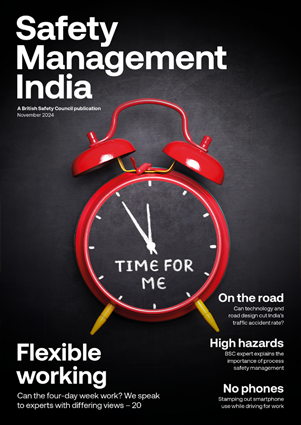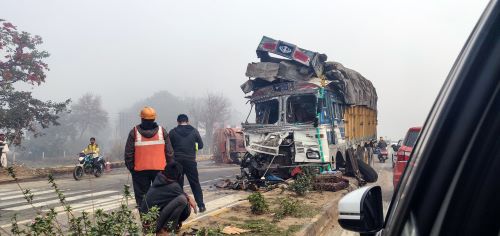Delegates attending British Safety Council’s first Annual Conference since 2019 on Friday 14 October gained insights into managing health, safety, and wellbeing from an impressive array of speakers, including Col. Dame Kelly Holmes, the double gold medal-winning Olympian.
Features
‘Put people’s health at forefront’ urge star-studded line up at British Safety Council’s annual conference
The day’s theme was ‘taking a holistic approach to health, safety and wellbeing’, which was woven through each of the presentations and discussions, with British Safety Council’s CEO Mike Robinson and Chairman Peter McGettrick setting the scene at the start of the day as to why the three are so inter-linked.
Peter McGettrick said: “Looking at any issue from a perspective of health, wellbeing and safety is a great recipe for creating a better world… If we do not think about the climate from the perspective of health, for instance, and how it affects our ability to work and thrive in the future, we really won’t end up creating a sustainable world, fit for future generations.
“This is why British Safety Council now takes a holistic, integrated approach to health, safety and wellbeing. We put the person at the centre, and use strategies tried and tested over many years by the health and safety profession – like plan, do, act, check – to help organisations create and implement strategies that work.”
Dame Kelly began with a real-life example of how stress can affect performance, as her clothes had been locked in a van following her appearance on ITV’s Loose Women and she was forced to come on stage in extremely high heels, which she said she found hard to walk in. “I decided today to roll with it,” Dame Kelly said. “For me, wellbeing means feeling happy, being your authentic self, and choosing how to describe your journey and the challenges you face.”
 Dame Kelly Holmes: "We judge the book by the cover way too much. Real inclusion means everyone is included." Photograph: Harry Richards
Dame Kelly Holmes: "We judge the book by the cover way too much. Real inclusion means everyone is included." Photograph: Harry Richards
The former Olympian shared with the audience how she didn’t used to feel she could be her authentic self, and that she felt immense stress, strain and pressure to perform and prove herself. Drawing on a moving and powerful account of how she only came out as being LGBTQ+ this year, having spent time in the Army and the public eye, Dame Kelly said: “I’m really interested now in the link between physical and mental health and how one affects the other… We judge the book by the cover way too much. Real inclusion means everyone is included. Diversity means we are all richer.”
Peter Kelly, the new Head of Programme at charity Mates in Mind set out why preventing mental health problems before they happen at work is so important – especially following the Covid pandemic and with a looming recession. “I used to visit construction sites as an HSE Inspector and wonder what led to fatal accidents. We have never addressed the reasons behind the 150 or so people dying each year at work. There was a 25 per cent increase in depression during the pandemic, according to the WHO. Eighteen people take their lives each day, two of whom are in construction. Preventing poor mental health is all about getting the right interventions in place.”
 Peter Kelly, the new Head of Programme at charity Mates in Mind set out why preventing mental health problems before they happen at work is so important. Photograph: Harry Richards
Peter Kelly, the new Head of Programme at charity Mates in Mind set out why preventing mental health problems before they happen at work is so important. Photograph: Harry Richards
Joining a panel discussion chaired by Nathan Baker, CEO of the Institute of Occupational Medicine, Marcus Herbert, Head of Wellbeing at British Safety Council talked about the responsibility of leaders to facilitate, line managers to initiate and employees to take action on their health, safety and wellbeing.
“Having a wellbeing strategy will help lead to better outcomes,” said Marcus. “To measure the impact of this, first think about what you want to achieve and then measure that.” Nathan also urged businesses to put health on their board agenda. “Are we really putting physical health at the forefront?” he said. “It’s about people and leadership, but ultimately self-leadership.”
Other speakers reinforced why putting health at the centre of how we plan and do business is so vital. Joining the conference virtually from Geneva, Dr Maria Neira, Director of the Public Health, Environment and Social Determinants of Health at the World Health Organization, called for “the health message to be at the forefront of a transition to a more sustainable world”.
Stuart Hughes, Head of Health and Safety at Petronas Formula One Team, talked about ‘sustainable resilience’ in occupational safety and health, and how learning from failure by sharing lessons with each other was crucial to their ability to succeed. “Everyone has ownership of their health, safety and wellbeing,” said Stuart, “Blame the problem not the person.”


FEATURES
Why changes to recycling legislation in England are an opportunity, not a burden
By on 12 November 2024

Road safety in India: could better road safety, vehicle technology and enforcement make driving for work safer?
By Orchie Bandyopadhyay on 10 November 2024
India has a poor road safety record, and research shows that commercial vehicles are a major contributor to the problem, with trucks estimated to be the single largest vehicle type involved in impacts leading to fatalities. We look at solutions that could make driving for work and the roads in general safer – from in-vehicle technology that warns truck drivers about unsafe behaviour to improving the design features of major highways.

